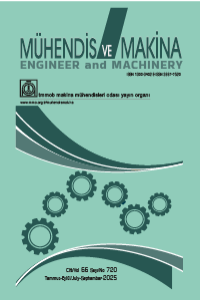Öz
Yaşam Döngüsü Analizi (daha yaygın bilinen tanımıyla Life Cycle Assessment /LCA) son yıllarda gündemde olan ve yakın gelecekte ise üretim yapan tüm firmaları oldukça fazla ilgilendirecek olan bir kavramdır. LCA bir ürün veya hizmetin üretimi, tüketimi ve bertarafı gibi beşikten mezara tüm aşamalarında ortaya çıkan çevresel etki ve kirliliklerin ISO 14040/44 standartlarına uygun olarak hesaplandığı bilimsel bir yöntemdir. Şirketler rekabet avantajı elde etmek için ürünlerinin çevresel etkilerini detaylı bir şekilde analiz etmekte, üretim esnasında çevre kirliliğine sebep olan bileşenleri tek tek belirleyip, mümkün olabildiğince azaltmak için çözümler üretmeye çalışmaktadır. LCA hesabında üretim sürecinde hangi hammaddeler kullanıldı, bunlar nereden geliyor? Toprak, tohum ve gübre ne olacak? Ürünler nasıl üretiliyor? Isıtma, su ve havalandırma nasıl? Hammaddenin üretim tesisine ulaştırılması ve nihai ürünün müşteriye teslimatı esnasında hammaddeler ve nihai ürün hangi güzergahtan taşındı, hangi ülkelerden geçti, bu ülkelerin düzeltme faktörleri nelerdir? Ürünler nereden nereye kaç km mesafede ve nasıl taşındı? Kamyon, gemi ve hava taşımacılığı gibi nakliyeden kaynaklanan çevresel etkiler de hesaba katılmalıdır. Bu çalışmada Nexans kablo fabrikasında üretilmekte olan bir kablo türü üzerinden yaşam döngüsü analizinin nasıl yapıldığı detayları ile verilmiştir. Analiz esnasında esas alınması gereken uluslararası standartlar ve bunların isterleri açıklanacaktır. Çalışmada PEP, EPD, ECO kablo, ECO PASSPORT, BREEAM, LEED sertifikası gibi yakın zamanda ülkemizde çok daha fazla üreticinin yüz yüze geleceği kavramlardan bahsedilmiştir.
Anahtar Kelimeler
Etik Beyan
Herhangi etik beyan gerektirecek bir durum olmadığını beyan ederim.
Destekleyen Kurum
Bulunmamaktadır.
Teşekkür
Bulunmamakatdır.
Kaynakça
- Bao, W., Lin, L., Song, D., Guo, H., Chen, L., Sun, L., Liu, M., & Chen, J. (2017), Comparative study on life cycle environmental impact assessment of copper and aluminium cables, IOP Conference Series: Earth and Environmental Science, 94, https://doi.org/10.1088/1755-1315/94/1/012166
- Crawford, L., Eckelman, M. J., & Zimmerman, J. (2010), Life Cycle Assessment of Overhead and Underground Primary Power Distribution Systems, Environmental Science & Technology, 44(14), 3784–3790, https://doi.org/10.1021/es9037879
- Na, KM., Jung, H. & Park, Y. (2021), Life-Cycle Assessment of a Railway Electric Power Feeding Cable for Replacement Planning: A Case Study of an Electric Railway in Korea. J. Electr. Eng. Technol. 16, 2275–2280. https://doi.org/10.1007/s42835-021-00726-4
- Simonson, M., Andersson, P., Emanuelsson, V., & Stripple, H. (2003), A life-cycle assessment (LCA) model for cables based on the fire-LCA model, Fire and Materials, 27(2), 71–89, https://doi.org/10.1002/fam.818
- Zackrisson, M., Jönsson, C., & Olsson, E. (2014), Life Cycle Assessment and Life Cycle Cost of Waste Management—Plastic Cable Waste, Advances in Chemical Engineering and Science, 4(2), 195–203, https://doi.org/10.4236/aces.2014.42025
- URL-1: http://www.pep-ecopassport.org (Son Erişim Tarihi: 11.07.2025)
Öz
Life Cycle Assessment (LCA) is a concept that has been on the agenda in recent years and will be of great interest to all manufacturing companies in the near future. LCA is a scientific method in which the environmental impacts and pollution that occur in all stages of a product or service from cradle to grave, such as production, consumption and disposal, are calculated in accordance with ISO 14040/44 standards. In order to gain competitive advantage, companies analyze the environmental impacts of their products in detail, identify the components that cause environmental pollution during production one by one and try to find solutions to reduce them as much as possible. Which raw materials were used in the production process in the LCA calculation, where do they come from? What about soil, seeds and fertilizer? How are the products produced? What about heating, water and ventilation? During the transportation of raw materials to the production facility and the delivery of the final product to the customer, which route were the raw materials and the final product transported, which countries did they pass through, what are the correction factors of these countries? How many kilometers from where to where and how were the products transported? Environmental impacts from transportation such as truck, ship and air transportation should also be taken into account. In this study, how life cycle analysis is performed on a cable type produced in Nexans cable factory is given in detail. The international standards that should be taken as basis during the analysis and their requirements will be explained. In the study, concepts such as PEP, EPD, ECO cable, ECO PASSPORT, BREEAM, LEED certification, which will be faced by many more manufacturers in our country in the near future, are mentioned.
Anahtar Kelimeler
Etik Beyan
No ethics declaration is required for the study.
Destekleyen Kurum
It does not exist.
Teşekkür
It does not exist.
Kaynakça
- Bao, W., Lin, L., Song, D., Guo, H., Chen, L., Sun, L., Liu, M., & Chen, J. (2017), Comparative study on life cycle environmental impact assessment of copper and aluminium cables, IOP Conference Series: Earth and Environmental Science, 94, https://doi.org/10.1088/1755-1315/94/1/012166
- Crawford, L., Eckelman, M. J., & Zimmerman, J. (2010), Life Cycle Assessment of Overhead and Underground Primary Power Distribution Systems, Environmental Science & Technology, 44(14), 3784–3790, https://doi.org/10.1021/es9037879
- Na, KM., Jung, H. & Park, Y. (2021), Life-Cycle Assessment of a Railway Electric Power Feeding Cable for Replacement Planning: A Case Study of an Electric Railway in Korea. J. Electr. Eng. Technol. 16, 2275–2280. https://doi.org/10.1007/s42835-021-00726-4
- Simonson, M., Andersson, P., Emanuelsson, V., & Stripple, H. (2003), A life-cycle assessment (LCA) model for cables based on the fire-LCA model, Fire and Materials, 27(2), 71–89, https://doi.org/10.1002/fam.818
- Zackrisson, M., Jönsson, C., & Olsson, E. (2014), Life Cycle Assessment and Life Cycle Cost of Waste Management—Plastic Cable Waste, Advances in Chemical Engineering and Science, 4(2), 195–203, https://doi.org/10.4236/aces.2014.42025
- URL-1: http://www.pep-ecopassport.org (Son Erişim Tarihi: 11.07.2025)
Ayrıntılar
| Birincil Dil | Türkçe |
|---|---|
| Konular | Makine Mühendisliği (Diğer) |
| Bölüm | Araştırma Makalesi |
| Yazarlar | |
| Yayımlanma Tarihi | 30 Eylül 2025 |
| Gönderilme Tarihi | 5 Mart 2025 |
| Kabul Tarihi | 25 Nisan 2025 |
| Yayımlandığı Sayı | Yıl 2025 Cilt: 66 Sayı: 720 |
Derginin DergiPark'a aktarımı devam ettiğinden arşiv sayılarına https://www.mmo.org.tr/muhendismakina adresinden erişebilirsiniz.
ISSN : 1300-3402
E-ISSN : 2667-7520

